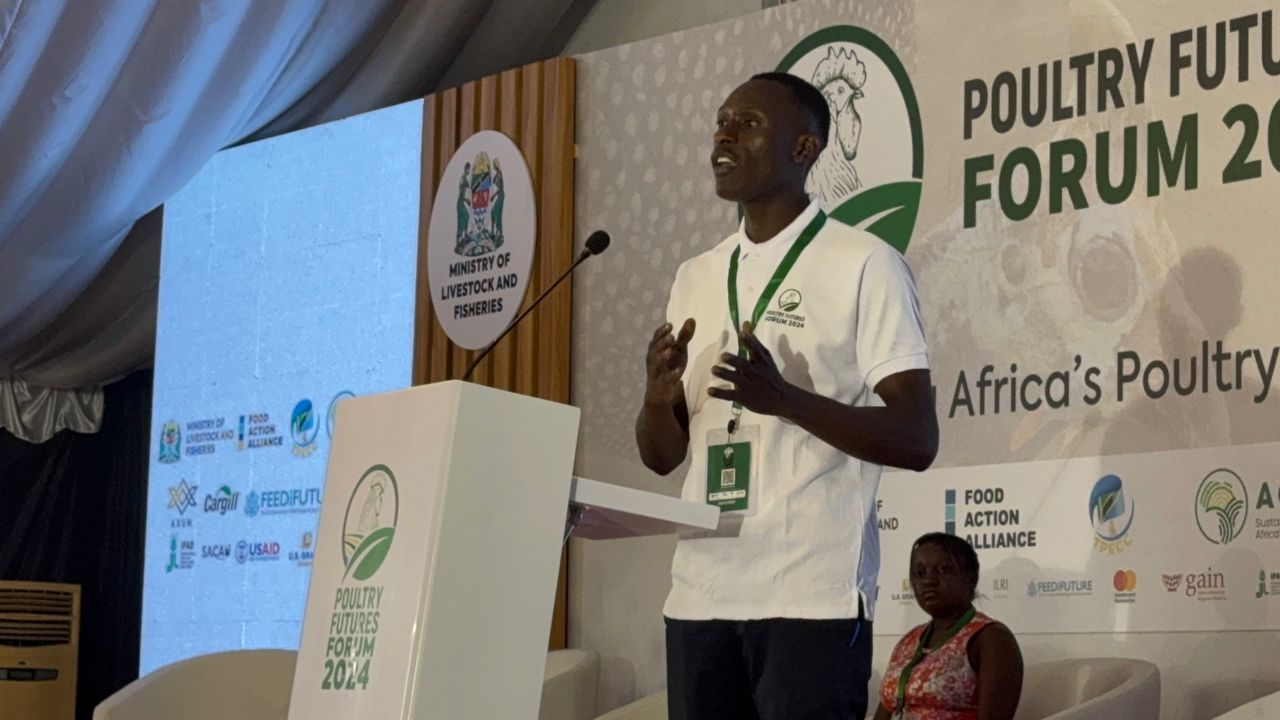The Poultry Futures Forum 2024 in Dar es Salaam focused on empowering youth and promoting gender inclusion as pivotal to the future of the poultry industry in Southern Africa. Young farmers from Tanzania and Malawi shared their inspiring stories, showcasing how technology, innovation, and resilience can drive change in the sector. Their experiences emphasized the need for investment and support to enable youth and women to take the lead in sustainable poultry farming.
In Tanzania, poultry has long been a part of family life, with chickens playing a crucial role in household livelihoods. However, young farmers like Omari Musa are now advocating for commercialising poultry farming as a path to greater economic opportunity. Omari shared how youth-focused initiatives are helping transform traditional poultry keeping into a profitable venture.
“Our families have always lived with chickens, but now it is time to move towards commercial poultry farming. With the right support, youth can lead this transformation.”
One such initiative is TangaYetu, under which the Kuku Pesa Group is making significant strides in empowering young farmers. Supported by Fondation Botnar, this program has partnered with AKM Glitters, a company that has helped reach 118 young people now actively keeping poultry. These youth are learning the trade and supporting 98 other poultry keepers across Tanga City, Pangani, and Muheza District Councils.
“Through working with TangaYetu and AKM Glitters, we have been able to reach young farmers who are changing the landscape of poultry farming in our communities. We are providing support to those who want to scale up and commercialize their poultry businesses,” Omari explained.
Access to Funding for Youth
Despite these advances, Omari highlighted the pressing need for financial support to help young farmers expand their operations. Loan providers like EFTA are stepping in, offering funding options where youth can secure a starter fund by providing 25% of the capital, while EFTA covers the remaining 75%.
“Youth need access to funding if we are to commercialize poultry farming. Programs like EFTA are making a difference by offering loan support, but we still need more opportunities for financing,” Omari urged.
By tapping into local resources, technology, and innovative financing models, Tanzania’s youth are leading the shift from traditional to commercial poultry farming. This shift has the potential to make poultry a cornerstone of the national economy and a solution to food security.
Malawian Youth: Technology and Innovation for Sustainable Poultry Farming
At the Poultry Futures Forum 2024, Grace Gondwe, a young farmer from Malawi, shared her inspiring story of resilience and innovation in the poultry sector. Grace, a university student with a passion for agriculture, saw an opportunity to create employment for herself and others amidst the country’s high unemployment rate. What began as a modest effort to raise broilers quickly evolved into a pioneering venture that now supports many farmers.
“When I was in my third year of university, I saw the challenge of unemployment and thought, why not create employment for myself and others? Poultry farming became my path.”
Grace initially focused on broiler production, but soon encountered major challenges. The market in Malawi was dominated by large companies practicing vertical integration, which made it nearly impossible for small-scale farmers like her to compete. The high cost of production—especially feed—further strained her business. After two years of struggling with broilers, Grace decided to pivot and explore opportunities with indigenous chickens, a more sustainable and manageable option for smallholder farmers.
“The monopolized market and the high cost of production made it difficult for me to continue with broilers. I realized I needed to change my approach, so I turned to indigenous chickens,” she explained.
Innovation Through Technology: Feed Optimization Software
Determined to address the high costs of production, particularly feed, Grace leveraged her background in animal science to develop a feed optimization software. This software allows farmers to create customized feed formulas tailored to their specific farming needs, reducing reliance on expensive commercial feeds. The tool has been a game-changer for both Grace and other small-scale farmers, improving profitability while lowering costs.
“We created a software that allows farmers to formulate feed unique to their needs. This innovation has reduced costs and increased profitability by over 10%, making poultry farming more sustainable for young farmers,” she said.
This technology has not only empowered Grace to scale her own poultry business but has also opened doors for other farmers in Malawi to adopt more cost-effective and efficient farming practices.
Empowering Youth in Agriculture
Grace’s journey is a testament to the power of innovation and resilience in overcoming the challenges faced by smallholder farmers in Malawi. As a youth ambassador for the Farmers Union of Malawi, Grace is now using her platform to advocate for the inclusion of more young people in the agricultural sector. She believes that with the right support—both financial and technical—youth can drive the transformation of the poultry industry and contribute to national food security.
“Being experienced in poultry production has opened doors for me. I’ve become a consultant, not just any consultant, but one who uses technology to improve farming efficiency. I’m helping other young farmers start their own poultry businesses and achieve sustainable growth,” Grace noted.
Her innovative approach highlights the broader potential of youth in agriculture, where technology and fresh perspectives can lead to breakthroughs that address long-standing issues in the sector.
A Call to Action for Investors and Stakeholders
Grace concluded her speech by calling on investors and stakeholders to actively support youth in agriculture. She emphasized that young people are not just beneficiaries but potential partners in creating sustainable solutions for the poultry industry. She urged the forum participants to invest in youth-driven innovations and help create a more inclusive agricultural ecosystem.
“To the investors here today, there are many young people like me who are ready to make a difference. We need your support in funding and mentorship to scale up our innovations and make the poultry industry stronger and more sustainable,” she urged.
